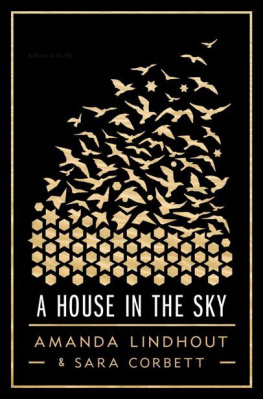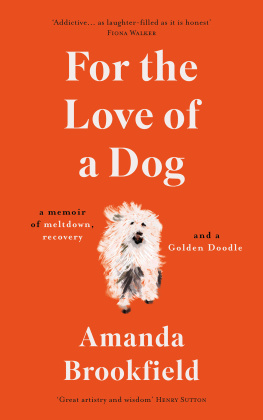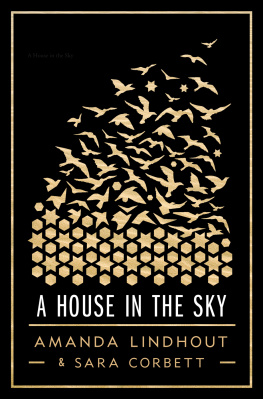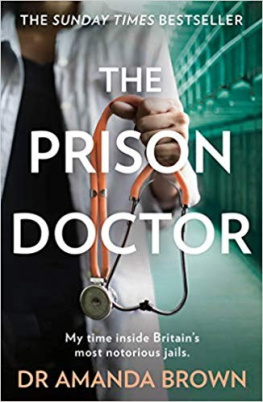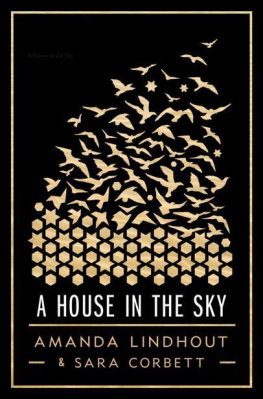Thank you for downloading this Scribner eBook.
Join our mailing list and get updates on new releases, deals, bonus content and other great books from Scribner and Simon & Schuster.
C LICK H ERE T O S IGN U P
or visit us online to sign up at
eBookNews.SimonandSchuster.com
For my mom and two dads
&
Katherine Porterfield
In the burned house I am eating breakfast.
You understand: there is no house, there is no breakfast,
yet here I am.
Margaret Atwood, from Morning in the Burned House
Prologue
W e named the houses they put us in. We stayed in some for months at a time; other places, it was a few days or a few hours. There was the Bomb-Making House, then the Electric House. After that came the Escape House, a squat concrete building where wed sometimes hear gunfire outside our windows and sometimes a mother singing nearby to her child, her voice low and sweet. After we escaped the Escape House, we were moved, somewhat frantically, to the Tacky House, into a bedroom with a flowery bedspread and a wooden dresser that held hair sprays and gels laid out in perfect rows, a place where, it was clear from the sound of the angry, put-upon woman jabbering in the kitchen, we were not supposed to be.
When they took us from house to house, it was anxiously and silently and usually in the quietest hours of night. Riding in the backseat of a Suzuki station wagon, we sped over paved roads and swerved onto soft sandy tracks through the desert, past lonely-looking acacia trees and dark villages, never knowing where we were. We passed mosques and night markets strung with lights and men leading camels and groups of boisterous boys, some of them holding machine guns, clustered around bonfires along the side of the road. If anyone had tried to see us, we wouldnt have registered: Wed been made to wear scarves wrapped around our heads, cloaking our faces the same way our captors cloaked theirsmaking it impossible to know who or what any of us were.
The houses they picked for us were mostly deserted buildings in tucked-away villages, where all of usNigel, me, plus the eight young men and one middle-aged captain who guarded uswould remain invisible. All of these places were set behind locked gates and surrounded by high walls made of concrete or corrugated metal. When we arrived at a new house, the captain fumbled with his set of keys. The boys, as we called them, rushed in with their guns and found rooms to shut us inside. Then they staked out their places to rest, to pray, to pee, to eat. Sometimes they went outside and wrestled with one another in the yard.
There was Hassam, who was one of the market boys, and Jamal, who doused himself in cologne and mooned over the girl he planned to marry, and Abdullah, who just wanted to blow himself up. There was Yusuf and Yahya and Young Mohammed. There was Adam, who made calls to my mother in Canada, scaring her with his threats, and Old Mohammed, who handled the money, whom we nicknamed Donald Trump. There was the man we called Skids, who drove me out into the desert one night and watched impassively as another man held a serrated knife to my throat. And finally, there was Romeo, whod been accepted into graduate school in New York City but first was trying to make me his wife.
Five times a day, we all folded ourselves over the floor to pray, each holding on to some secret ideal, some vision of paradise that seemed beyond our reach. I wondered sometimes whether it would have been easier if Nigel and I had not been in love once, if instead wed been two strangers on a job. I knew the house he lived in, the bed hed slept in, the face of his sister, his friends back home. I had a sense of what he longed for, which made me feel everything doubly.
When the gunfire and grenade blasts between warring militias around us grew too thunderous, too close by, the boys loaded us back into the station wagon, made a few phone calls, and found another house.
Some houses held ghost remnants of whatever family had occupied thema childs toy left in a corner, an old cooking pot, a rolled-up musty carpet. There was the Dark House, where the most terrible things happened, and the Bush House, which seemed to be way out in the countryside, and the Positive House, almost like a mansion, where just briefly things felt like they were getting better.
At one point, we were moved to a second-floor apartment in the heart of a southern city, where we could hear cars honking and the muezzins calling people to prayer. We could smell goat meat roasting on a street vendors spit. We listened to women chattering as they came and went from the shop right below us. Nigel, who had become bearded and gaunt, could look out the window of his room and see a sliver of the Indian Ocean, a faraway ribbon of aquamarine. The waters proximity, like that of the shoppers and the cars, both comforted and taunted. If we somehow managed to get away, it was unclear whether wed find any help or simply get kidnapped all over again by someone who saw us the same way our captors didnot just as enemies but enemies worth money.
We were part of a desperate, wheedling multinational transaction. We were part of a holy war. We were part of a larger problem. I made promises to myself about what Id do if I got out. Take Mom on a trip. Do something good for other people. Make apologies. Find love.
We were close and also out of reach, thicketed away from the world. It was here, finally, that I started to believe this story would be one Id never get to tell, that I would become an erasure, an eddy in a river pulled suddenly flat. I began to feel certain that, hidden inside Somalia, inside this unknowable and stricken place, we would never be found.
1
My World
W hen I was a girl, I trusted what I knew about the world. It wasnt ugly or dangerous. It was strange and absorbing and so pretty that youd want to frame it. It came to me in photographs and under gold covers, in a pile of magazines, back-issue National Geographic s bought for twenty-five cents apiece at a thrift store down the road. I kept them stacked on a nightstand next to my bunk bed. I reached for them when I needed them, when the apartment where we lived got too noisy. The world arrived in waves and flashes, as a silvery tide sweeping over a promenade in Havana or the glinting snowfields of Annapurna. The world was a tribe of pygmy archers in the Congo and the green geometry of Kyotos tea gardens. It was a yellow-sailed catamaran in a choppy Arctic Sea.
I was nine years old and living in a town called Sylvan Lake. The lake was six miles long, a Pleistocene gash in the vast brown prairie of Alberta, Canadawell north of the Calgary skyline, well south of the oil rigs scattered around Edmonton, a hundred or so miles east of the Rocky Mountains, a solidly in-between place. In July and August, tourists came to float on the lakes calm surface and toss fishing lines from the docks of their cottages. There was a downtown marina next to a red-topped lighthouse and a small amusement park where vacationers bought tickets to ride down a giant spiraling water slide or run through a play maze made from brightly painted plywood. All summer long, the sounds of laughing kids and the buzz of motorboats floated through town.
We were new to Sylvan Lake. My mother, having split from my father a few years earlier, had moved my two brothers and me there from Red Deer, the small city where wed always lived, fifteen minutes down the road. Russell, her boyfriend, had come with us, and so had his younger brother, Stevie. His uncles and cousins and other brothers and second cousins often dropped in on us for payday parties and ended up in our apartment for days, camped out in our living room. I remember their faces hoisted in sleep, their slim brown arms hanging from the sides of our chairs. My mother referred to Russell and his family as Native, but around town, people called them Indians.

